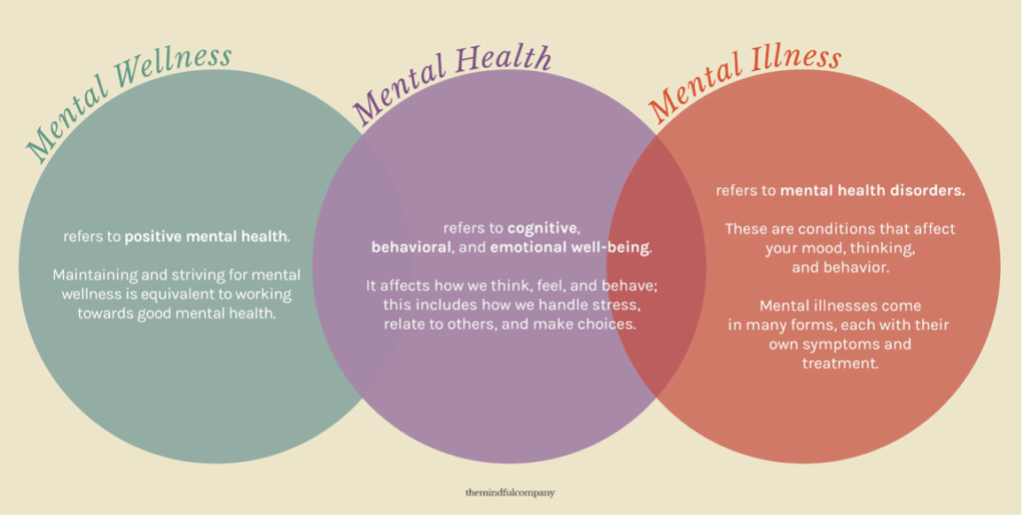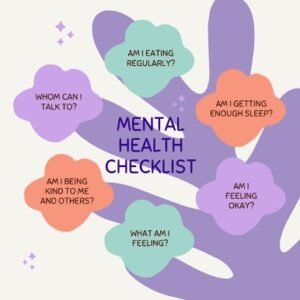From Stigma to Self-Care: A Mental Health Journey
By Yanely Lopez
Illustration by Merel Hamminga
How did mental health go from being a taboo topic to even becoming a TikTok trend? Why are more people, like celebrity Selena Gomez, speaking so openly about it? Is it possible that everyone is now just “mentally ill”?

Navigating conversations about mental health can still be challenging for many. Common worries include, “Will I say the wrong thing?” or “Will I face backlash?” Yet, some embrace discussions with surprising openness.
But before we continue, what exactly is mental health?
Let’s take a step back. If asked, “What is physical health?” you might respond with words like “exercise,” “nutrition,” and “well-being.” But if I were to ask, “What is mental health?” would you immediately associate it with things like “anxiety,” “depression,” or “stress”?
Why is it that when describing mental health, we tend to describe mental illnesses instead? Mental health is distinct from mental illness, just like physical health is distinct from a medical condition. Dr. Karthik Ramanan (2020) emphasizes that maintaining good mental health doesn’t mean the absence of mental illness, just as good physical health doesn’t imply being free of all physical ailments.
To summarize the World Health Organization (WHO, 2022), mental health is our state of mind and “ability to respond to life’s challenges,” which is influenced by various protective and risk factors (MindMattersAustralia, 2015, 01:05). This highlights that mental health reflects our overall mental state and resilience in navigating life’s uncertainties (e.g., significant life events, social issues, physical threats). Dr. Karthik Ramanan (2020) also identifies five pillars crucial for everyday mental health: psychology, relationships, nutrition, sleep, and exercise.
Since mental illness is often intertwined with mental health in research, mental illness will also be explored, as it plays a crucial role in understanding overall mental well-being.

Milestones in Mental Health
Over the past two decades, discussions around mental health have shifted dramatically. From changes in legal policies to workplace programs to trends on social media, mental health has become a more accepted part of public conversation. But how did we get here? This change didn’t happen overnight, and in some places, these conversations are still not widely accepted. In other countries, like the U.S., Netherlands, and U.K., however, mental health conversations are here.
Around the 2010s, public figures began being more open about their mental health and struggles. For example, Britney Spears openly discussed her postpartum depression in 2008, and Robin Williams’s self-inflicted death in 2014 brought attention to the realities of mental health struggles (Ahmed, 2023; Sullivan, 2024). Projects like Oprah Winfrey and Prince Harry’s 2021 docuseries The Me You Can’t See have recently sparked public conversations, helping normalize mental health discussions (New England Recovery Center, 2024).
The rise of smartphones and apps in the 2010s also contributed to mental health milestones, with the launching of Headspace, a mindful and meditation app based in the U.K. with resources and information regarding mental health. It gained popularity over the years, with workplaces and universities promoting additional discounts (e.g., student and teacher discounts). Additionally, campaigns to increase mental health services led by the National Alliance on Mental Illness (NAMI) spread hashtags like #MentalHealthMatters and #MentalHealthAwareness, especially during “Mental Health Awareness Month” each May and “World Mental Health Day” on October 10th.
Significant policy shifts included the 2013 update of the Diagnostic and Statistical Manual of Mental Illness (DSM-5) by the American Psychiatric Association, which refined diagnostic criteria and added new disorders like binge eating disorder. In 2019, WHO officially recognized burnout as an “occupational phenomenon,” further legitimizing discussions around workplace mental health and preventive measures.
In Europe, initiatives such as the EU Compass for Action on Mental Health and Well-being (2015-2018) promoted collaborative mental health practices and the development of policies for mental health promotion. New services like the MIND Foundation (2016) and @Ease (2017) also emerged, further integrating public support.
The impact of COVID-19 on mental health was significant and widespread. Research from the Dutch National Institute for Public Health and the Environment (RIVM) showed an increase in anxiety, depression, and loneliness during lockdowns, prompting expanded mental health support, including telehealth services. Universities in the Netherlands, such as Maastricht University and the University of Amsterdam, conducted research and launched preventive measures to address the mental health impacts of the pandemic. Social media trends like #EndTheStigma and the “Hot Girl Walk” further boosted mental health visibility. Even companies like PVH responded by granting employees mental health days off (PVH Corp, 2021).

Student Mental Health
With the growing focus on mental health, universities have recognized the need to adapt. Research studies in the Netherlands have shown that students’ mental well-being may be lowering with an increase in psychological or psychosocial problems (RVIM, 2022; Struijs, 2023). While causes can lie in the intensity of the university workload, other outside factors also contribute to this (e.g., an increase in digital technology, personal stressors, etc.).
To help combat these adverse effects, universities have provided information on their websites, implemented services like student psychologists on campus or promoted external services like All Ears Amsterdam, and even partnered with programs like Caring University (see resources below for general and UvA-specific links). Caring University is a free program for all students aimed at enhancing mental well-being through guided modules for improving your mood, reducing stress, overcoming procrastination, addressing eating disorders, fighting sleep deprivation, and dealing with Covid-related complaints. After choosing a specific program to follow, each student automatically receives personal guidance from an online coach, where the student can remain anonymous in these conversations if preferred.
In addition to Caring Universities, some bachelor’s programs at UvA have courses for first-year students (i.e., “Academic Skills Tutoring”) dedicated to helping the student navigate their overall study plans (e.g., Communication Science bachelor program). While not directly promoting mental health initiatives or support, these courses can promote resources, such as study advisers if questioning study programs, or ease some stress in the academic planning phases by clarifying potential study routes. Furthermore, in addition to regularly scheduled workshops, there are annual events allocated to UvA’s “Well-Being Week” that can aid in strengthening one’s mental health (check monthly emails from UvA for updates and to sign up).
Despite these initiatives, it appears that either many students don’t know about them or don’t seek them out (e.g., UvA students unaware of the “Student Well-Being” resource on their Canvas page; Struijs, 2023). This not only results in students not taking advantage of such resources, but also universities not receiving feedback on how to improve their programs.

Into The Future
So, what does this all mean? Firstly, initiatives for student mental health must be better promoted. This can be achieved through various methods, such as distributing physical flyers across all campuses, leveraging social media platforms, incorporating announcements in lectures and tutorials, and setting up pop-up stands in busy areas on campus. Additionally, increasing the frequency and variety of mental well-being events will provide more opportunities for students to engage. Moreover, more bachelor’s programs should consider adding courses like “Academic Skills Tutoring” to guide and support students in navigating their academic journey.
As for what mental health initiatives could look like in the future? Universities might start to create specific policies to support students from marginalized backgrounds, making sure everyone has fair access to mental health resources. This means recognizing students’ differing needs and aiming to help them all. Additionally, as new issues like climate change and the challenges of living in a digital world arise, ongoing research and innovation in mental health will help schools develop better support strategies for today’s students.
As technology advances, we already see how online services have increased (e.g., telehealth, Caring University, Headspace), but how could AI play a role in this? To describe briefly, AI is already used in some mental health healthcare services, such as early detection of mental disorders, customization of treatment plans, or AI-powered chatbots/virtual assistants. (Alhuwaydi, 2024; Kaplan, 2024; Olawade et al., 2024; Thakkar et al., 2024). ChatGPT has introduced a feature called the “Therapist Prompt,” designed to help users identify their feelings and thoughts, encouraging them to take action by reaching out for support, even if they are uncertain about how to proceed. This tool can serve as a gentle nudge for those who might be struggling with their mental health, fostering awareness and prompting them to connect with others or seek professional help (PromptOpti, 2024).
It is possible that in the future, AI tools may make mental healthcare more accessible and affordable, particularly for underserved populations, thereby further reducing stigma and encouraging more individuals to seek help. However, maintaining the human element in therapy is crucial, as AI should complement rather than replace the therapeutic relationship between patients and therapists. It is also noteworthy to realize any biases in research that could affect AI results.

While society has made notable progress in recognizing and addressing mental health through public figures, policy changes, and university-led programs, there remains a need for more effective promotion of these resources and an adaptation to emerging challenges. Increasing the visibility and accessibility of mental health services on campuses is crucial for supporting a diverse student body. Additionally, research should focus on exploring the distinctions between public and self-stigmas related to mental health.
Looking ahead, as technology continues to advance, incorporating AI in mental health care presents opportunities for increased accessibility. Still, it must be approached carefully to maintain human connections and address potential biases. Continuous innovation and promotion of mental health initiatives will be key in fostering a supportive and resilient environment for future generations.

Mental Health Resources
All Ears Amsterdam https://www.allearsamsterdam.com/
@Ease https://www.ease.nl/en-index.php
Caring University E-Health https://student.uva.nl/en/articles/2022-too-much-on-your-mind-do-something-about-it
For UvA students
(Mental Health)https://student.uva.nl/en/topics/mental-health
(Health and Well-Being)https://student.uva.nl/en/topics/health-and-well-being?utm_campaign=canvas_student_wellbeing&utm_medium=banner&utm_source=google
(Training, Workshops, & Groups)https://student.uva.nl/en/topics/training-workshops-information-sessions-and-groups
(Events)https://student.uva.nl/en/events?filteredTopic=stress_en_mentale_gezondheid
Headspace https://www.headspace.com/mental-health?origin=navigation
References:
Ahmed, A. (2023, October 19). ‘Out of my mind with grief’: Britney Spears details 2008 breakdown in memoir. The Guardian. https://www.theguardian.com/music/2023/oct/19/out-of-my-mind-with-grief-britney-spears-details-2008-breakdown-in-memoir
Alhuwaydi, A. (2024). Exploring the role of artificial intelligence in mental healthcare: Current trends and future directions – A narrative review for a comprehensive insight. Risk Management and Healthcare Policy, Volume 17, 1339–1348. https://doi.org/10.2147/rmhp.s461562
American Psychiatric Association. (2013). Diagnostic and statistical manual of mental disorders (5th ed.). https://doi.org/10.1176/appi.books.9780890425596
Dr. Karthik Ramanan. (2020, February 12). Doctor explains what is mental health vs mental illness [Video]. YouTube. https://www.youtube.com/watch?v=saETdH-ffuE
European Commission. (2024, October 28). EU-compass for action on mental health and well-being. Public Health. https://health.ec.europa.eu/non-communicable-diseases/mental-health/eu-compass-action-mental-health-and-well-being_en
Kaplan, S. (2024, January 12). Dr. Jodi Halpern on why AI isn’t a magic bullet for mental health. Berkeley Public Health. https://publichealth.berkeley.edu/news-media/research-highlights/why-ai-isnt-a-magic-bullet-for-mental-health
MindMattersAustralia. (2015, March 27). Module 1.3a What is mental health? [Video]. YouTube. https://www.youtube.com/watch?v=ArOTqcMH2G0
New England Recovery Center. (2024, October 29). Prince Harry on mental health, addiction and ending the stigma. https://www.newenglandrecoverycenter.org/blog/prince-harry-on-mental-health-addiction-and-ending-the-stigma/
Olawade, D. B., Wada, O. Z., Odetayo, A., David-Olawade, A. C., Asaolu, F., & Eberhardt, J. (2024). Enhancing mental health with artificial intelligence: Current trends and future prospects. Journal of Medicine Surgery and Public Health, 3, 100099. https://doi.org/10.1016/j.glmedi.2024.100099
PromptOpti. (2024, September 20). A ChatGPT therapist prompt for customized mental health conversations and therapeutic support. PromptOpti. https://www.promptopti.com/a-chatgpt-therapist-prompt-for-mental-well-being/
PVH Corp. (2021). 2021 corporate responsibility report. In PVH. https://www.pvh.com/-/media/Files/pvh/responsibility/PVH-CR-Report-2021.pdf
RVIM. (2022). Monitor Mentale gezondheid en Middelengebruik Studenten hoger onderwijs. Deelrapport I. Mentale gezondheid. In Rijksinstituut Voor Volksgezondheid En Milieu Ministerie Van Volksgezondheid, Welzijn En Sport. https://www.rivm.nl/documenten/monitor-mentale-gezondheid-en-middelengebruik-studenten-hoger-onderwijs-deelrapport-1
Struijs, S. (2023). The mental well-being of university students in the Netherlands: The fourth measurement by the Caring Universities consortium. In Maastricht University. https://www.maastrichtuniversity.nl/file/bijlage-3-mental-well-being-students-iv-report-caring-universities-110723rapportage-2023pdf#:~:text=Few%20students%20report%20experiencing%20poor,the%20past%20year%20(71.3%25)
Sullivan, M. (2024, August 9). Oscar-winning actor Robin Williams dies at 63. History. https://www.history.com/this-day-in-history/oscar-winning-actor-robin-williams-dies-at-63
Thakkar, A., Gupta, A., & De Sousa, A. (2024). Artificial intelligence in positive mental health: a narrative review. Frontiers in Digital Health, 6. https://doi.org/10.3389/fdgth.2024.1280235
World Health Organization: WHO. (2019, May 28). Burn-out an “occupational phenomenon”: International classification of diseases. World Health Organization. https://www.who.int/news/item/28-05-2019-burn-out-an-occupational-phenomenon-international-classification-of-diseases
World Health Organization: WHO. (2022, June 17). Mental health. https://www.who.int/news-room/fact-sheets/detail/mental-health-strengthening-our-response

Yanely Lopez is a third-year Communication Science student at the University of Amsterdam, taking a business minor at Vrije University. She loves bringing ideas to life and is eager to join as an editor and be part of the media and outreach team. She also enjoys trying new foods and activities with friends, running, reading, and spending cozy nights in.

